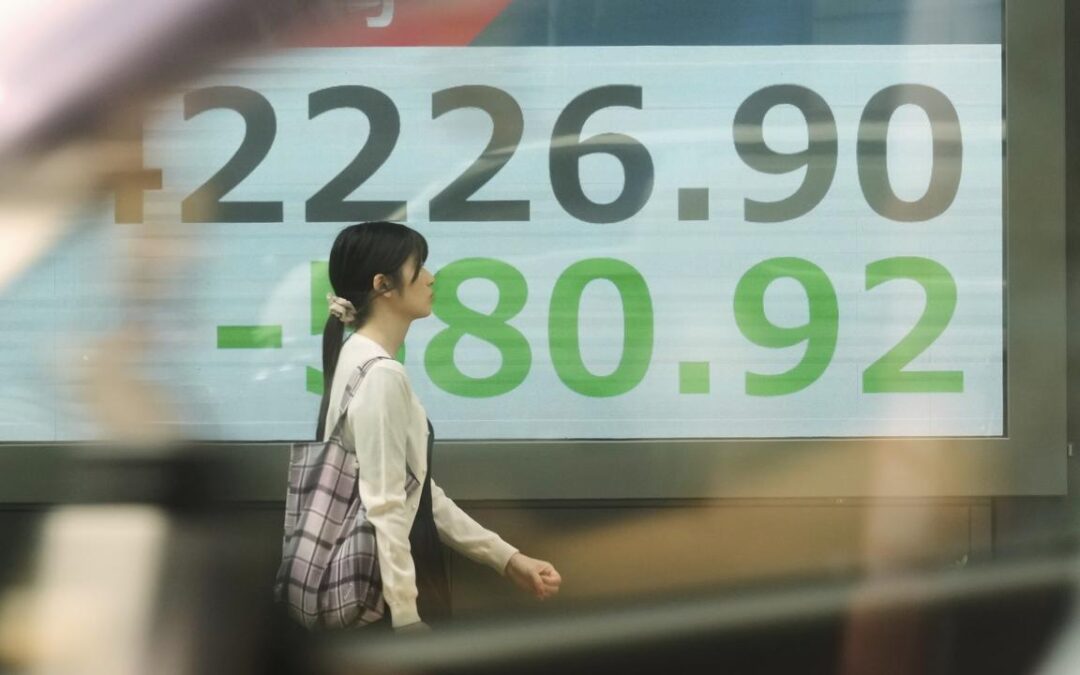
Asia upbeat as markets await US inflation data
Asian stocks edged higher on Friday, riding a tech-driven rally on Wall Street, with investor focus now turning to a key US inflation reading due later in the day for further clues on the Federal Reserve’s rate outlook.
The results from artificial intelligence heavyweight Nvidia’s this week, which fell short of investors’ lofty expectations, still confirmed that AI infrastructure spending remains strong, helping lift the S&P 500 and Dow Jones Industrial Average to record high closes overnight.
Markets in Asia latched on to the positive momentum on Friday as MSCI’s broadest index of Asia-Pacific shares outside Japan rose 0.4 per cent, though European and US stock futures slipped.
EUROSTOXX 50 futures fell 0.2 per cent while FTSE futures eased 0.08 per cent. S&P 500 futures dipped 0.08 per cent and Nasdaq futures lost 0.15 per cent.
“Despite the uncertainty around China for Nvidia, the headline revenue growth numbers don’t really suggest that the overall AI story is faltering much. Expectations are just already very high,” said Thomas Mathews, head of markets for Asia-Pacific at Capital Economics.
“The big picture though is that earnings are still growing very rapidly for US tech companies, and unless that changes materially, the stock market there will probably keep doing ok.”
In China, the tech-focused STAR 50 Index slid 2.5 per cent after a jump of more than 7.0 per cent in the previous session.
Shares of Chinese chip firm Cambricon Technologies tumbled more than 5.0 per cent after the company on Thursday issued a risk alert to investors in a stock exchange filing, citing a sharp rise in its stock prices since late July.
“Certainly, when you see such a very, very large move, and then some warning coming from the company, you could think that there has been a little bit of overshooting,” said Frank Benzimra, head of Asia equity strategy at Societe Generale.
“But for me, that is a very normal way of the market functioning, because we all know that the market is going to undershoot on the downside and to overshoot on the upside.”
Still, the CSI300 blue-chip index was up 0.7 per cent and Hong Kong’s Hang Seng Index gained 0.5 per cent. Japan’s Nikkei slipped 0.4 per cent.
In the broader market, focus now turns to the release of the US PCE price index data – the Fed’s preferred measure of inflation – later on Friday.
“The market will be on the lookout for any signs of whether or not some of these tariff pass-throughs are starting to filter through into the PCE deflator,” said Khoon Goh, head of Asia research at ANZ.
“There are three important pieces of data ahead of the September FOMC. So there’s the PCE, then there’s the payrolls number next week, and then the CPI reading.”
Traders are currently pricing in an 86 per cent chance of a rate cut in September, up from 63 per cent a month earlier, according to the CME FedWatch tool.
Fed Governor Christopher Waller on Thursday said he wants to start cutting interest rates next month and “fully expects” more rates cuts to follow to bring the Fed’s policy rate closer to a neutral setting.
The heightened expectations of imminent Fed rate cuts left the dollar headed for a monthly fall of 2.0 per cent against a basket of currencies on Friday.
The euro was last down 0.2 per cent at $US1.1657 ($A1.7871), pressured in part by political and fiscal worries in France, while sterling eased 0.08 per cent to $US1.3497 ($A2.0692), though was set for a monthly gain of more than 2.0 per cent.
The dollar was also battling headwinds from worries about Fed independence as President Donald Trump steps up his campaign to exert more influence over monetary policy, including his latest attempt to fire Fed Governor Lisa Cook.
Cook filed a lawsuit on Thursday claiming Trump has no power to remove her from office.
Elsewhere, oil prices fell on Friday, with Brent crude futures down 0.68 per cent to $US68.15 ($A104.48) a barrel, while US crude slid 0.7 per cent to $US64.14 ($A98.33) per barrel.
Spot gold was down 0.17 per cent at $US3,410.69 ($A5,228.87) an ounce.
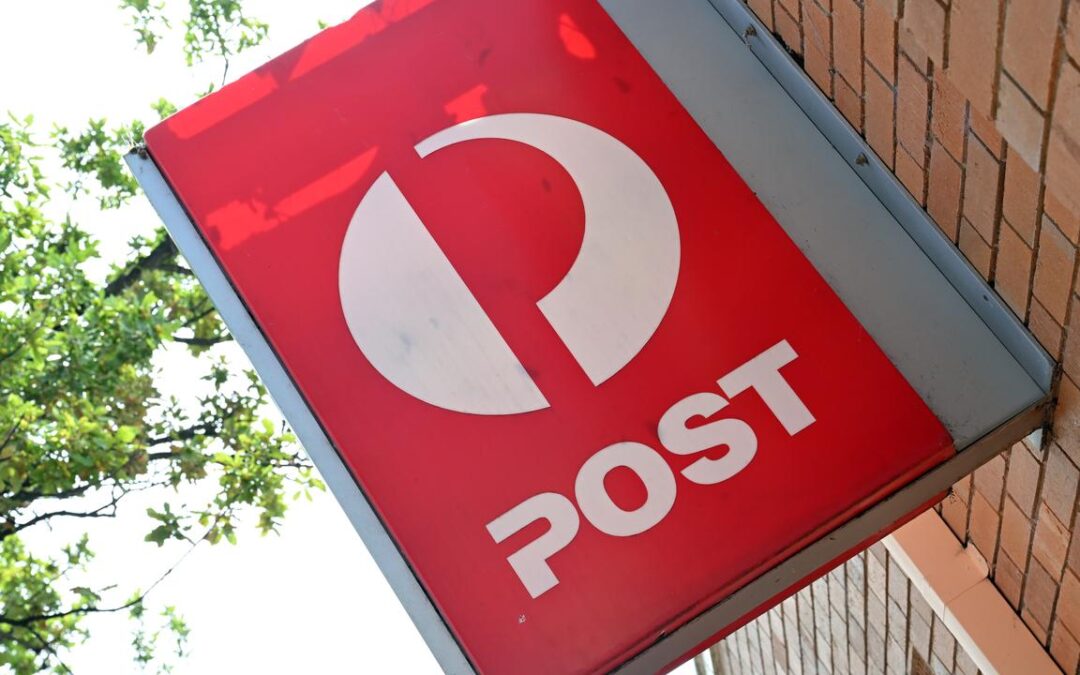
Parcels deliver Aust Post a profit while letters lag
Australia’s mail service has posted its first profit in three years as a record number of parcels delivered more revenue for the company, boosting its pre-tax return to $18.8 million.
But its letter business continued to drop during the past year, losing $230 million and was only saved from a greater fall by federal, state and local election material.
In its 2025 full year results on Friday, Australia Post said its letter business had fallen into “permanent decline” and postage prices would need to rise again.
The results also came just days after the government-owned network surprised customers by suspending parcel deliveries to the United States, following an expansion of US tariffs.
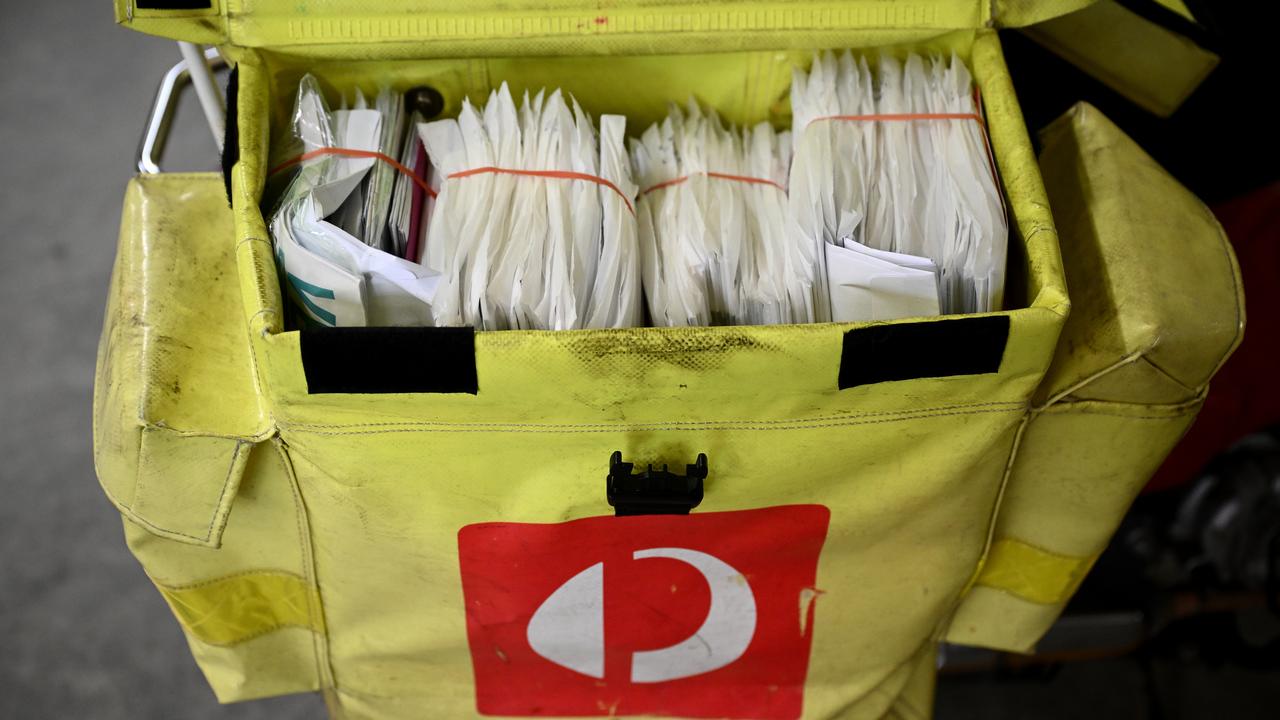
Australia Post’s pre-tax profit is its first since 2022 and a significant improvement from last year’s $88.5 million loss.
Record Christmas parcel deliveries of 102.8 million contributed to the result, with revenue from parcels and services rising by 2.9 per cent to $7.64 billion.
Domestically, parcel volumes grew by 2.6 per cent despite growing competition from global tech firms such as Amazon and small logistics start-ups.
Australians continued to send fewer letters during the year, with volumes down 5.4 per cent to 1.66 billion.
Despite a 30-cent increase to the basic postage rate in April 2024 and a move to deliver letters every second business day, Australia Post lost $230.4 million on the service.
Australia Post chief executive Paul Graham said letter volumes fell 11.7 per cent when state and federal election one-offs were excluded.
“Our letter service is in permanent decline and we don’t expect it will ever return to profit,” he said.
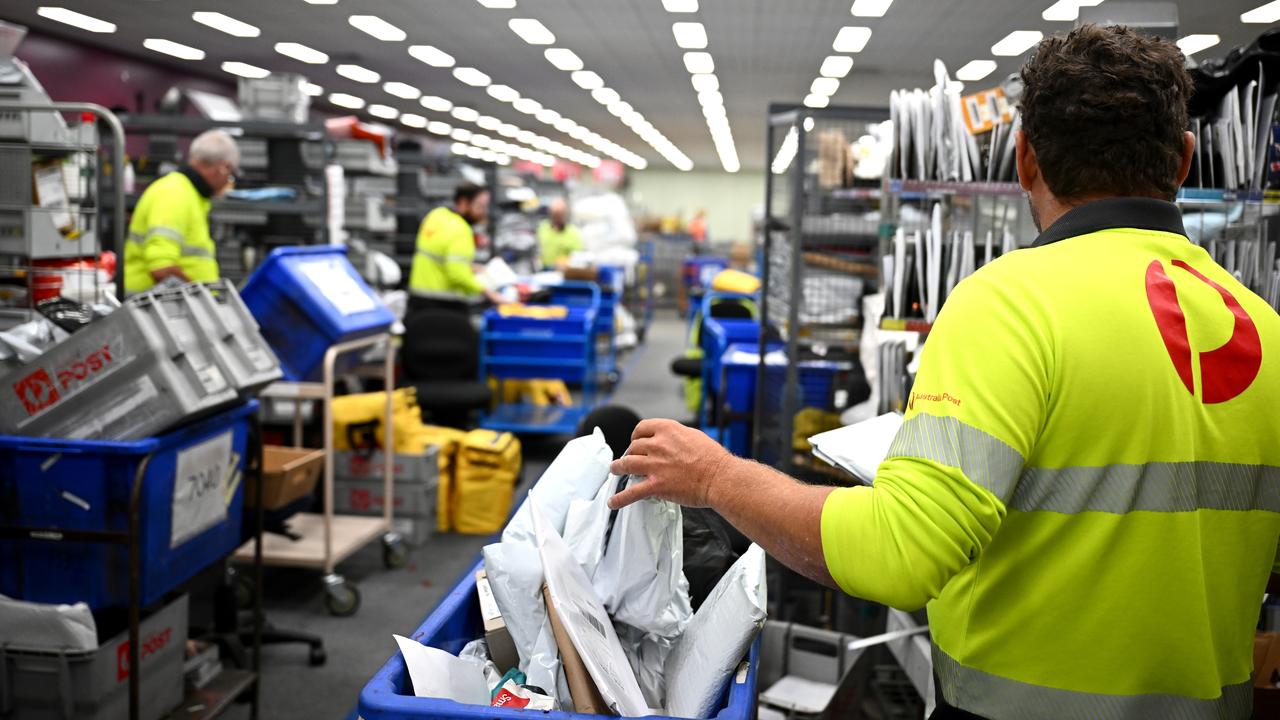
The company flagged further postage fee rises would be needed to address the growing cost of the service.
The company invested $371.9 million in fleet, technology and facilities during the year, including a parcel-processing facility at Melbourne Airport, delivery centre at Blacktown in NSW, and parcel and letters facility at Narrandera in regional NSW.
Australia Post could not afford to be complacent about its operation, Mr Graham said, amid growing competition for parcel deliveries.
“Competition in the parcels market remains fierce, with global online marketplace retailers ramping up their presence in Australia,” he said.
“We are facing sector-wide headwinds like many other global postal operators.”
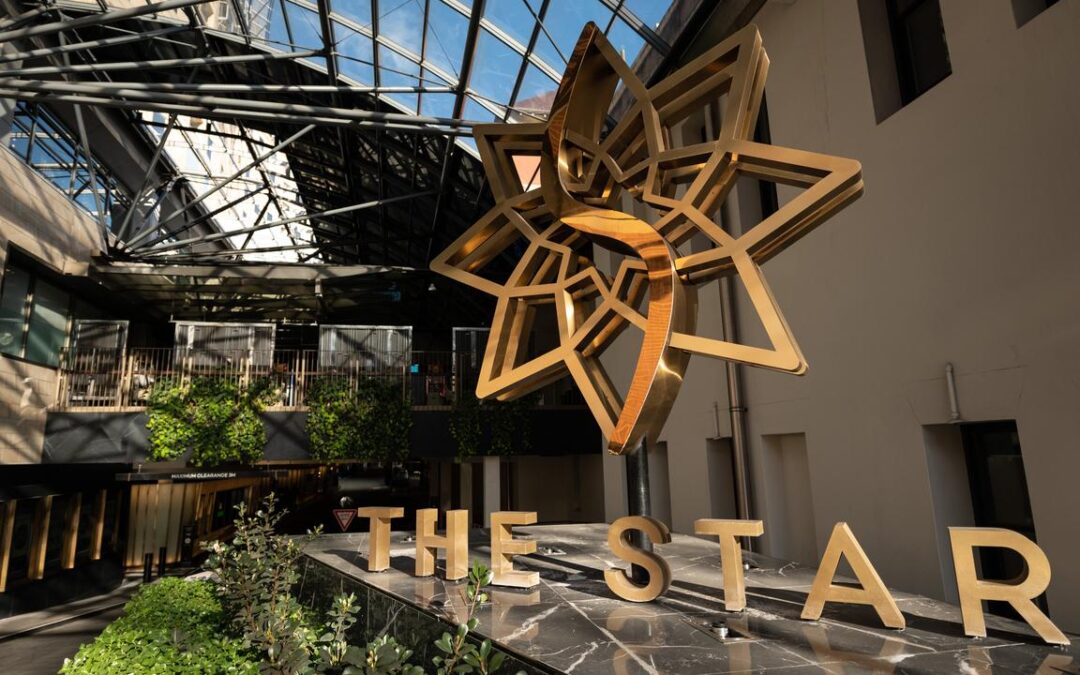
Star Entertainment Group posts $471m full-year loss
Star Entertainment Group says it lost $471.5 million last financial year and its soft trading conditions continued in July.
The embattled casino group also disclosed Friday it had $189 million in available cash as of Monday, $45 million less than it had as of June 30, although that’s partly because it paid $16 million in back taxes during that time.
Star said it brought in $92.1 million in revenue and incurred a $7.4 million operating loss in July, slightly ahead of its June quarter average.
“There remains material uncertainly regarding the group’s ability to continue as a going concern,” the company said, citing six items that are critical to its financial outlook.
Among them is a looming money-laundering penalty from AUSTRAC, Australia’s financial watchdog, which has proposed a fine of $400 million; Star’s ability to restore its casino licenses; and completing a $300 million investment from Bally’s and pub baron Bruce Mathieson.
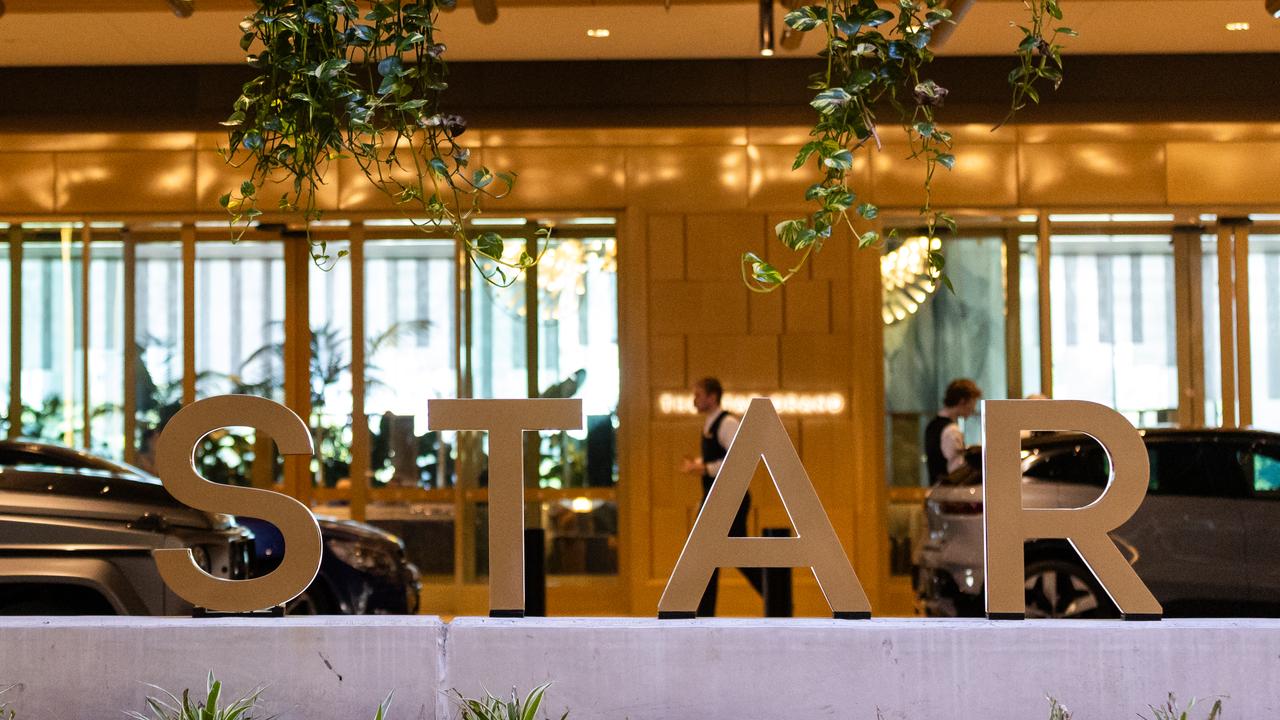
Star also owes $434.3 million to its senior lenders and needs them to continue to waive financial covenants if it is to survive, with September 30 the next deadline for a waiver.
“Our announcement today highlights a number of key interdependencies that are critical to the group’s future,” CEO and managing director Steve McCann.
“The group continues to require significant support from a range of its stakeholders including governments, regulators, lenders and investors.
“Without that support it will be difficult to navigate the various challenges facing the group and to create a sustainable future for the business.”
Star is due to receive another $67 million in funds from Bally’s and Mr Mathieson by October 9, the last tranche of their $300 million investment.
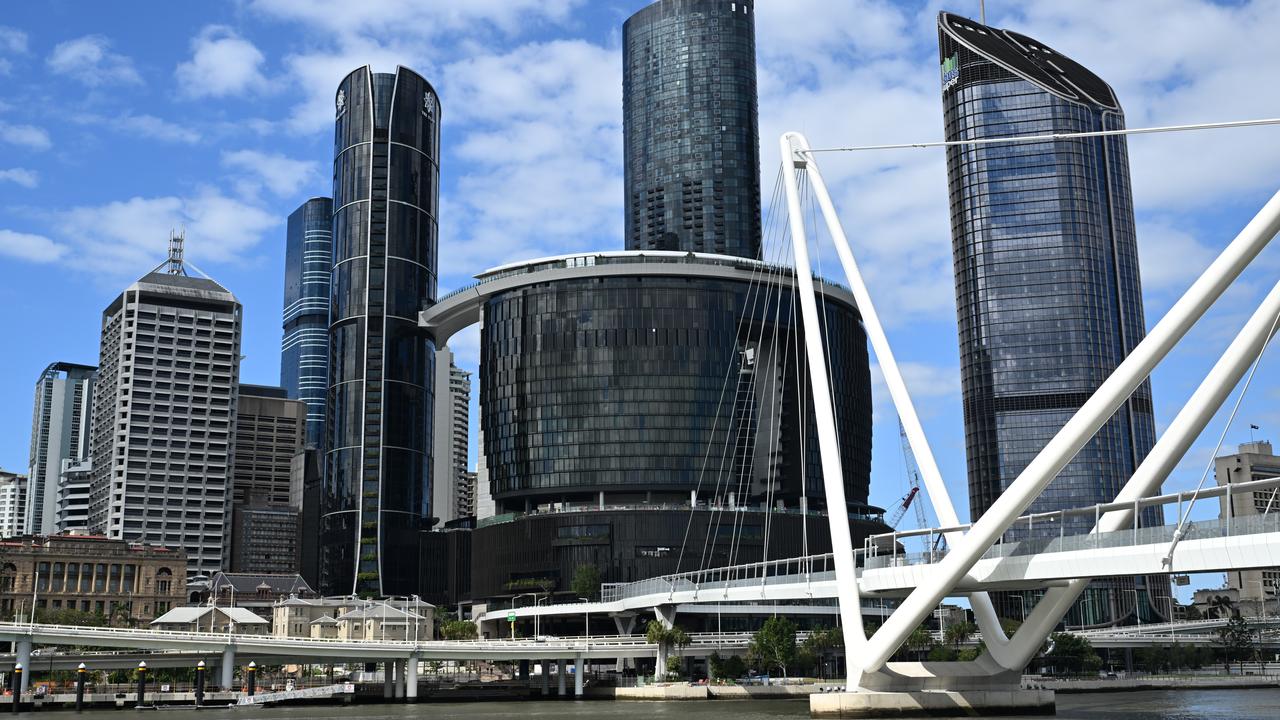
Star also earlier this month executed a binding agreement to sell its half-stake in the debt-ridden Queen’s Wharf Brisbane entertainment hub to its Hong Kong partners, with a plan to consolidate its position on the Gold Coast.
Star’s $472 million loss for last financial year, while massive, is far less than the $1.7 billion loss it posted for 2023/24.
Group revenue was down 29 per cent to $1.2 billion for the 12 months to June 30, which Star said reflected challenging trading conditions.
In part that’s because mandatory carded play and cash limits at The Star Sydney, requirements imposed by regulators, have led to a loss of business.
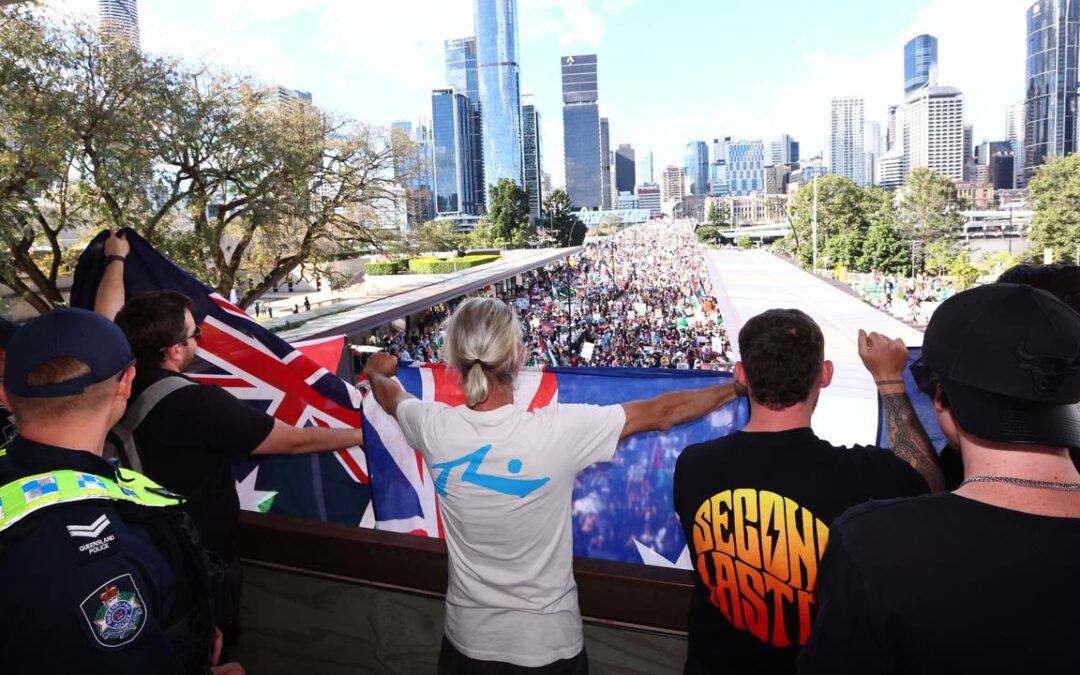
‘No place for hate’: leaders condemn anti-migrant rally
Australia’s leaders are hitting out at planned anti-immigration rallies across the country as non-white ethnic groups fear being targeted.
March for Australia, a group linked to white-nationalist ideology, plans to hold gatherings in every capital city on Sunday.
This ideology claims people of European ancestry are being “replaced” en masse by migrants from other ethnic groups.
The federal government declared there is no place for “any type of hate in Australia” ahead of the protests.
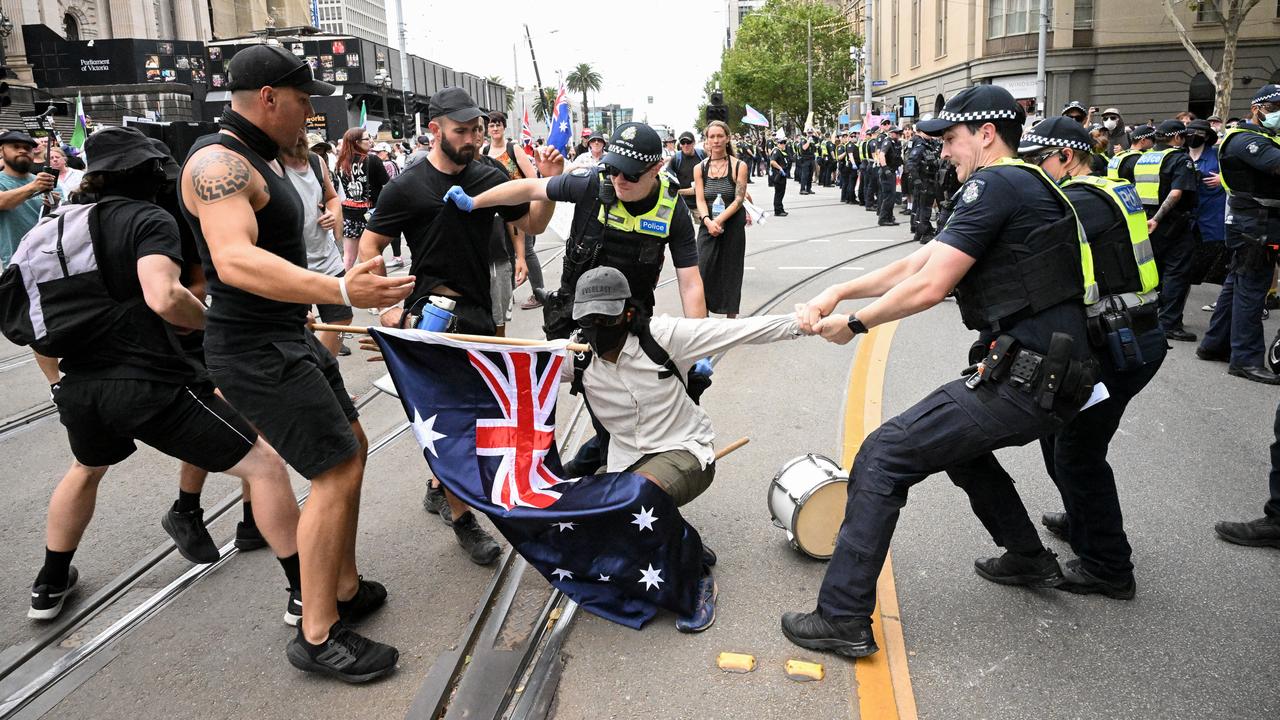
The nation has experienced an alarming spate of anti-Semitic and anti-Islamophobic attacks since the conflict in the Middle East, prompting fears social cohesion is being eroded.
People who sought to divide and undermine Australian society were not welcome, Home Affairs Minister Tony Burke said.
“We stand with modern Australia against these rallies. Nothing could be less Australian,” he said.
Multicultural Affairs Minister Anne Aly said Australia’s diversity was an integral and valued part of its national identity.
“We will not be intimidated,” she said.
“This brand of far-right activism grounded in racism and ethnocentrism has no place in modern Australia.”
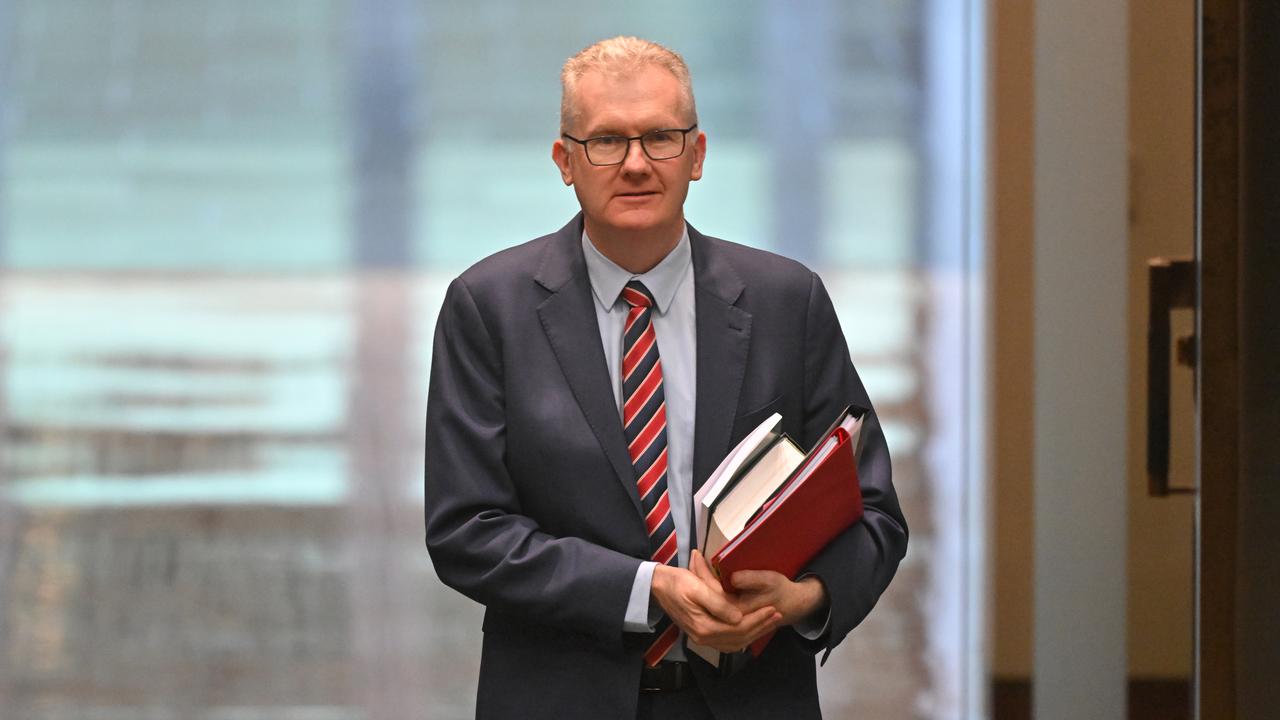
Opposition multicultural affairs spokesman Paul Scarr said the material circulated for the planned rallies had caused great hurt.
“Debates in relation to immigration policy need to be conducted with the utmost of respect,” he said.
“No part of the Australian community should be singled out. To do so is divisive and wrong.”
Queensland MP Bob Katter on Thursday threatened to punch a journalist at a press conference where he had spruiked his attendance at the Brisbane rally.
Mr Katter unleashed on the Nine reporter after he was questioned about his Lebanese heritage.
“Oh mate, don’t say that because that irritates me, and I punch blokes in the mouth for saying that,” he said while pointing at the journalist.
The ACT Human Rights Commission urged people to report incidents if they witnessed others being vilified for their race, religion or colour.
The commission warned vilification remained illegal.
“We have been made aware of multicultural community members expressing their concern about working or going about their activities on the day of the rally for fear of what response the rally might provoke,” Commissioner Dr Pene Mathew said.
“Events such as this proposed rally in Canberra are inconsistent with those values and it is disappointing to see this occurring in the ACT.”
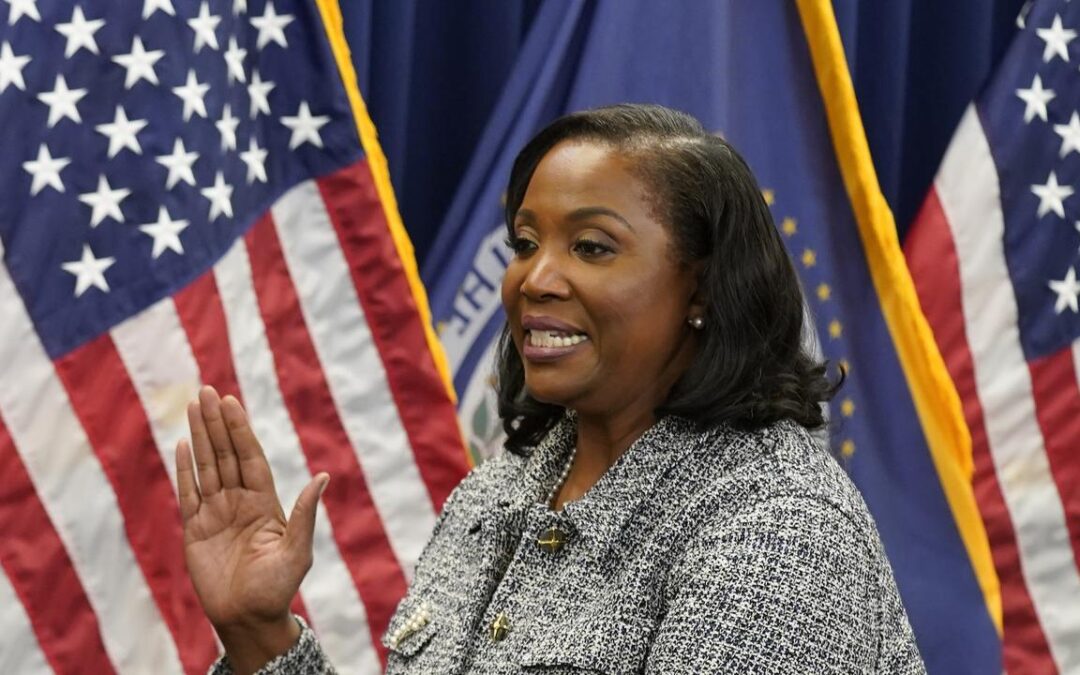
US Fed governor Cook sues Trump over bid to fire her
Federal Reserve governor Lisa Cook has filed a lawsuit claiming US President Donald Trump has no power to remove her from office, setting up a legal battle that could reset long-established norms for the country’s central bank.
Cook’s lawsuit said Trump, a Republican, violated a federal law allowing the president to remove a Fed governor only for cause when he took the unprecedented step on August 25 of announcing he would fire her.
The president has accused Cook of committing mortgage fraud in 2021, a year before she joined the Fed’s governing body.
But Cook’s lawsuit said an unsubstantiated allegation about conduct that took place before she was confirmed to her position at the central bank does not amount to cause.
“President Trump’s conception of ’cause’ has no limiting principle; it would allow him to remove any Federal Reserve Board member with whom he disagrees about policy based on chalked-up allegations,” her lawyers wrote in the lawsuit.
The lawsuit also accused Trump of violating her right to due process under the constitution by firing her without notice or a hearing.
The case is likely headed to the Supreme Court, where a conservative majority has at least tentatively allowed Trump to fire officials from other agencies although it recently signalled the Fed may qualify for a rare exception from direct control by the president.
Concerns about the Fed’s independence from the White House in setting monetary policy could have a ripple effect throughout the global economy.
The US dollar stumbled against other major currencies after Trump first said he would remove Cook.
A Fed spokesperson said on Tuesday, before the lawsuit was filed, that the Fed would abide by any court decision.
Cook was appointed to the Fed in 2022 by former president Joe Biden.
The law that created the Fed does not define “cause” or lay out any standard or procedures for removal.
No president has ever removed a Fed board member, and the law has never been tested in court.
Several federal laws requiring the president to have cause before removing members of other agencies say that cause can include neglect of duty, malfeasance and inefficiency.
Those laws could be a guide for courts to determine if Trump had cause to fire Cook.
Questions about Cook’s mortgages were first raised in August by William Pulte, a Trump appointee who is the director of the Federal Housing Finance Agency.
Pulte referred the matter to Attorney General Pamela Bondi for investigation.
Cook took out the mortgages in Michigan and Georgia in 2021 when she was an academic.
An official financial disclosure form for 2024 lists three mortgages held by Cook, with two listed as personal residences.
Loans for primary residences can carry lower rates than mortgages on investment properties, which are considered riskier by banks.
Some experts have questioned whether transactions that preceded Cook’s appointment to the Fed and were in the public record when she was vetted and confirmed by the US Senate could amount to adequate cause to remove her.
The administration could also argue that giving Fed governors any protections from removal violates the president’s broad constitutional powers to control the executive branch, as it has in lawsuits filed by other ex-officials.
Trump in an August 25 letter to Cook accused her of having engaged in “deceitful and criminal conduct in a financial matter” and said he did not have confidence in her integrity.
Cook in a statement at the time said that “no causes exist under the law, and (Trump) has no authority” to remove her from the job.
Her lawyers said that Trump’s “demands lack any proper process, basis or legal authority.”
Cook’s departure would allow Trump to name his fourth pick to the Fed’s seven-member board.
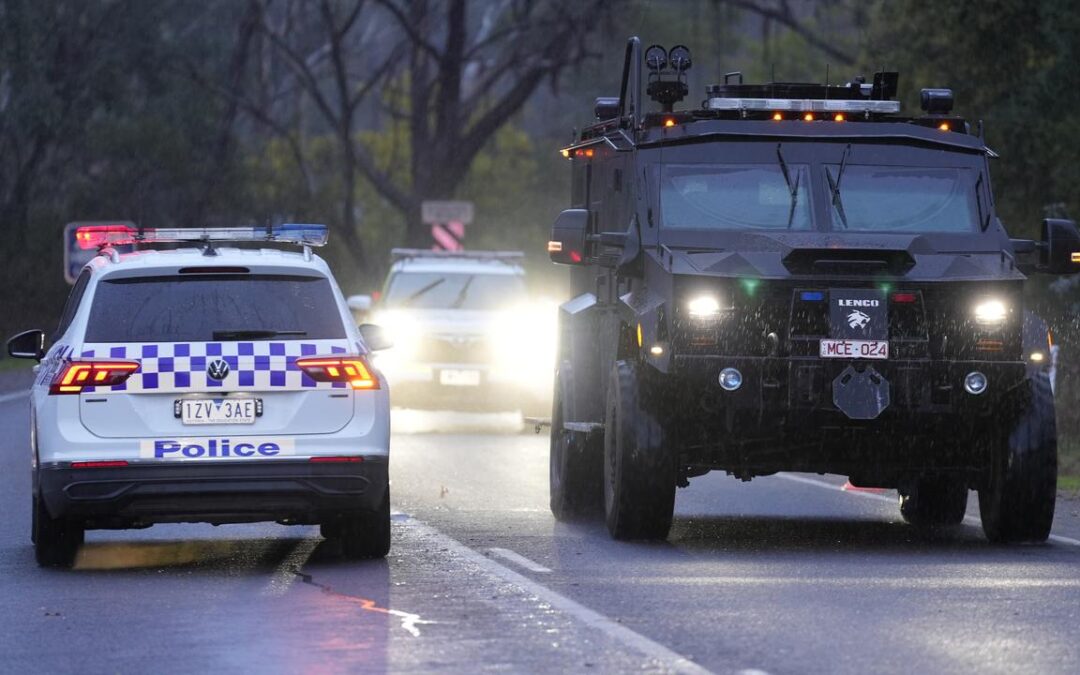
Dangerous terrain hampers search for accused cop killer
Dangerous terrain and bad weather is impeding the search for a fugitive accused of killing two police officers as tributes are paid to the men.
Detective Leading Senior Constable Neal Thompson, 59, and Senior Constable Vadim De Waart, 35, were shot dead while attempting to serve a search warrant at a Porepunkah property.
The accused gunman Dezi Freeman – also known as Desmond Filby – fled into bushland, plunging the town of about 1000 residents in Victoria’s high country into lockdown on Tuesday.

Two armoured BearCat vehicles left the now-vacant property, which lies at the foot of Mount Buffalo, on Thursday afternoon alongside several police cars, after hours of searching.
There have been no confirmed sightings of Freeman since he fled into surrounding bushland while heavily armed.
Thunderstorms are beginning to sweep through the region, bringing heavier rain and thick cloud cover to the search area.
“It’s really difficult terrain, it’s complex terrain and it’s not something that we, even with our specialist resources, can move through quickly,” Superintendent Brett Kahan said.
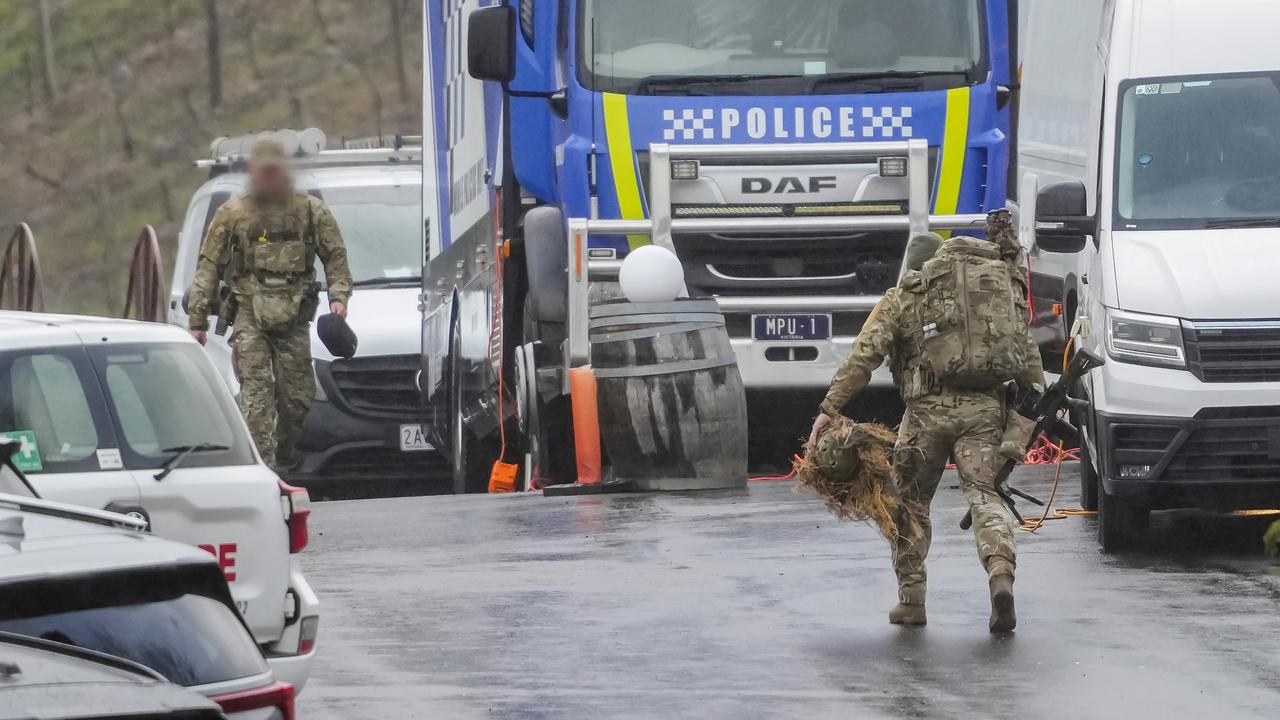
Deputy Commissioner Regional Operations Russell Barrett described the search as protracted and revealed police were searching “a number of properties” as part of their inquiries.
“What I would say to the community and say to anyone who may be considering harbouring or supporting him, they need to reconsider,” he told reporters in Wangaratta.
“They’re committing a criminal offence, and we will prosecute them.”
Police urged Freeman to give himself up.
“Ring triple zero, and we will support a surrender plan, that option is absolutely open to him,” Supt Kahan said.
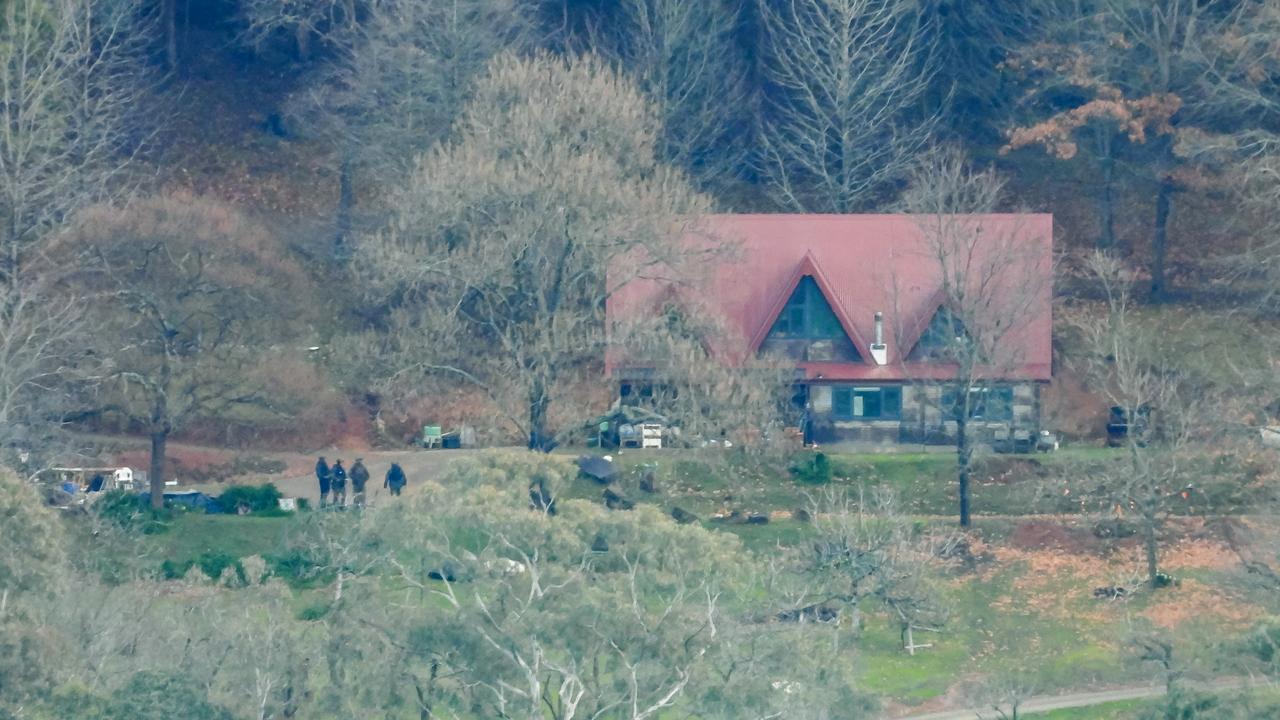
Freeman, who has bush survival experience, was last seen wearing dark green tracksuit pants, a dark green rain jacket, brown Blundstone boots and reading glasses, police said.
He is believed to be a sovereign citizen, an ideology that questions government authority and whose followers believe the rule of law doesn’t apply to them, and who disassociate from society.
The 56-year-old was known to police and a risk assessment was completed before 10 officers, including members of the sexual offences and child investigation team, attempted to serve a search warrant at the property.
His associates have warned he is capable of surviving for long periods in bushland.

Det Snr Const Thompson was only weeks away from retirement when he was killed, while Snr Const De Waart had a “great career in front of him” with his professionalism the talk of his colleagues, Mr Barrett said.
Chief Commissioner Mike Bush met with Det Snr Const Thompson’s partner Lisa, who is also a serving officer, on Thursday along with Victorian Premier Jacinta Allan and Police Minister Anthony Carbines.
Porepunkah residents were living “under the long and heavy shadow of unthinkable tragedy”, the premier said.
“Every part of their daily life is touched by fear, it is touched by uncertainty, and for so many it’s touched by grief,” she told parliament on Thursday.
Det Snr Const Thompson’s local cafe paid tribute to him on social media, describing him as a larger-than-life presence with a heart of gold.
Porepunkah Primary School reopened to students on Thursday after it went into lockdown following the shooting, although attendance was not mandatory.
Police and support staff were on site throughout the day.
Jean-Francois Rupp expressed mixed emotions when he dropped his six-year-old child at school.
“It’s all a bit weird and up in the air, but I suppose life’s got to continue,” he said.
“He just knows there’s a bad man out in the woods, so we’re going to keep the story to that for now.”
Police have issued advice recommending motorists heading for Bright, Falls Creek and Mount Hotham avoid travelling through Porepunkah.
They should instead travel through Running Creek and Mount Beauty, police advised.
“If you have an option not to go to the snow this weekend, take that option,” Supt Kahan said.
The bodies of the fallen officers were given a guard of honour by flashing-light police cars as they were taken to Melbourne’s Coroners Court on Wednesday night.
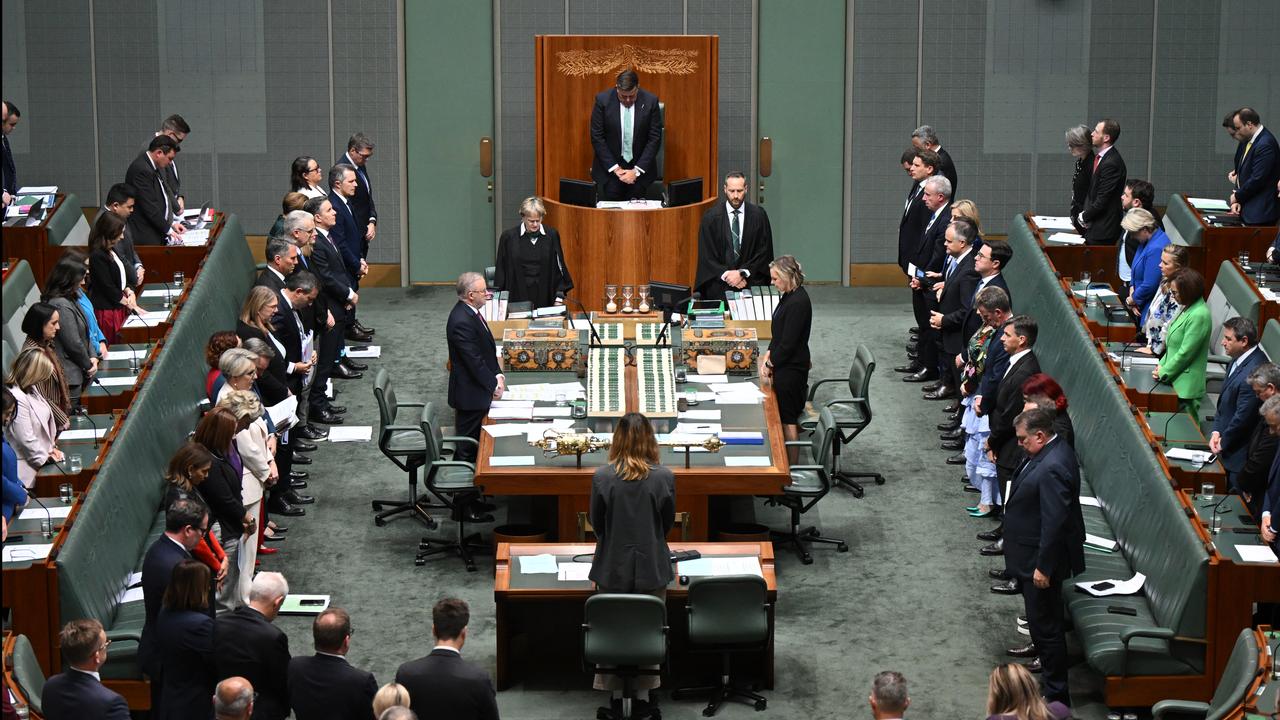
Prime Minister Anthony Albanese led a moment of silence for the pair in federal parliament on Thursday.
“Every time they put on their uniform, police officers put themselves on the line,” he said.
“And they do it for us.”
The officers were heroes and their deaths were heartbreaking for all Australians, Opposition Leader Sussan Ley said.
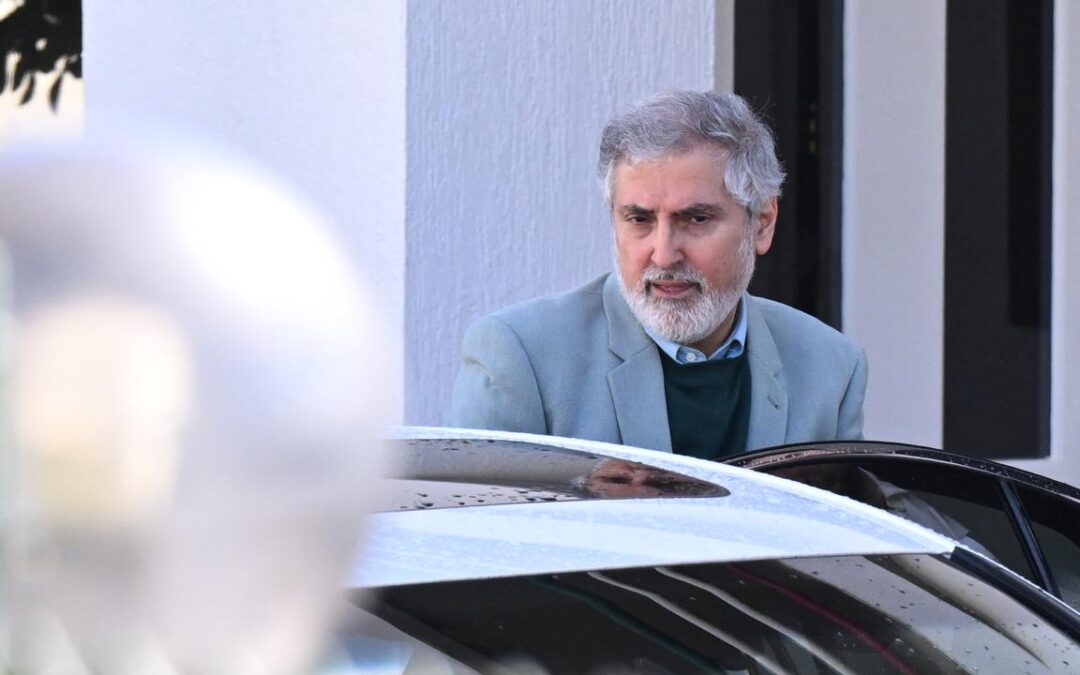
‘I love Australian people’: Iran ambassador speaks out
Iran’s ambassador insists he loves Australia, despite his imminent expulsion from the country, as the prime minister defends his security advice.
Iranian ambassador to Australia Ahmad Sadeghi was seen out the front of the embassy on Thursday, waving to journalists before his looming exit.
Mr Sadeghi was the first ambassador to be expelled from Australia since World War II, after national spy agency ASIO said it had credible evidence the Iranian Revolutionary Guard Corp had orchestrated at least two attacks on Jewish institutions in Sydney and Melbourne through criminals.
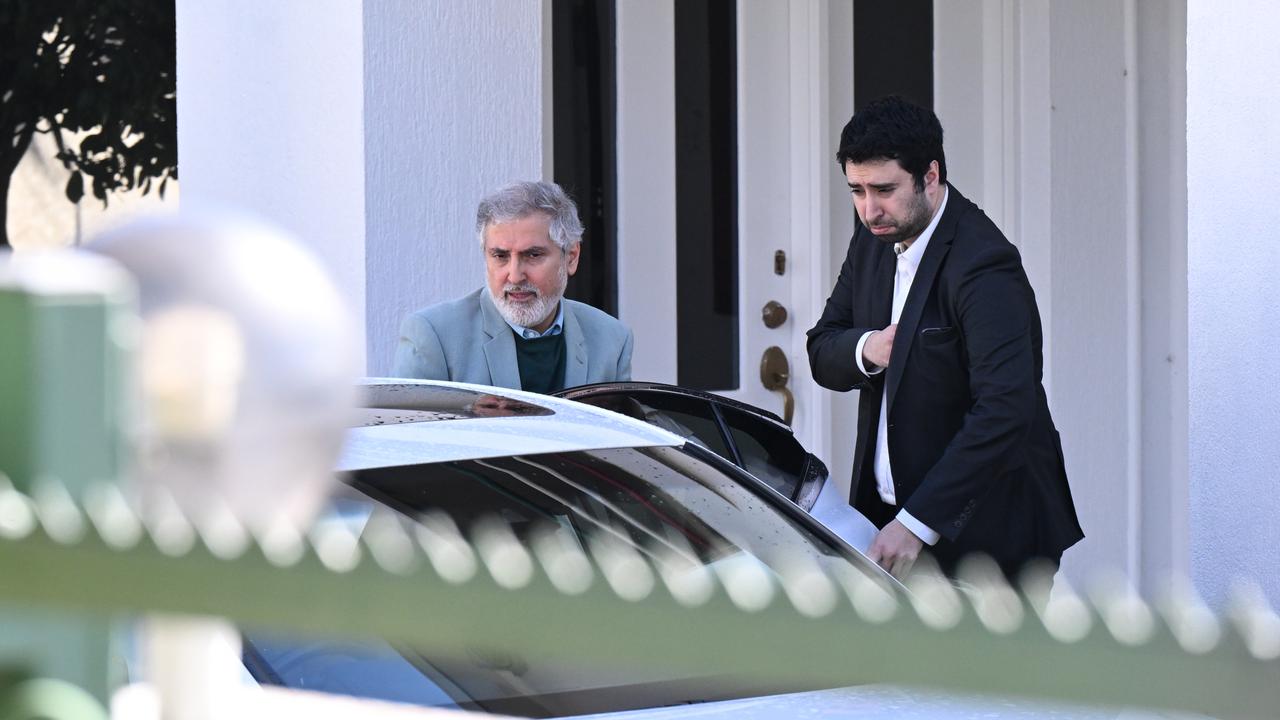
“I love Australian people, bye bye,” he told reporters on Thursday in his first public comments since the expulsion was announced.
But when asked if he thought the decision by the Australian government was wrong, he replied “no comment”.
His words coincided with Anthony Albanese defending the decision for him to go.
Laws are also being drafted to list the Iran’s Revolutionary Guard Corps as a terrorist organisation.
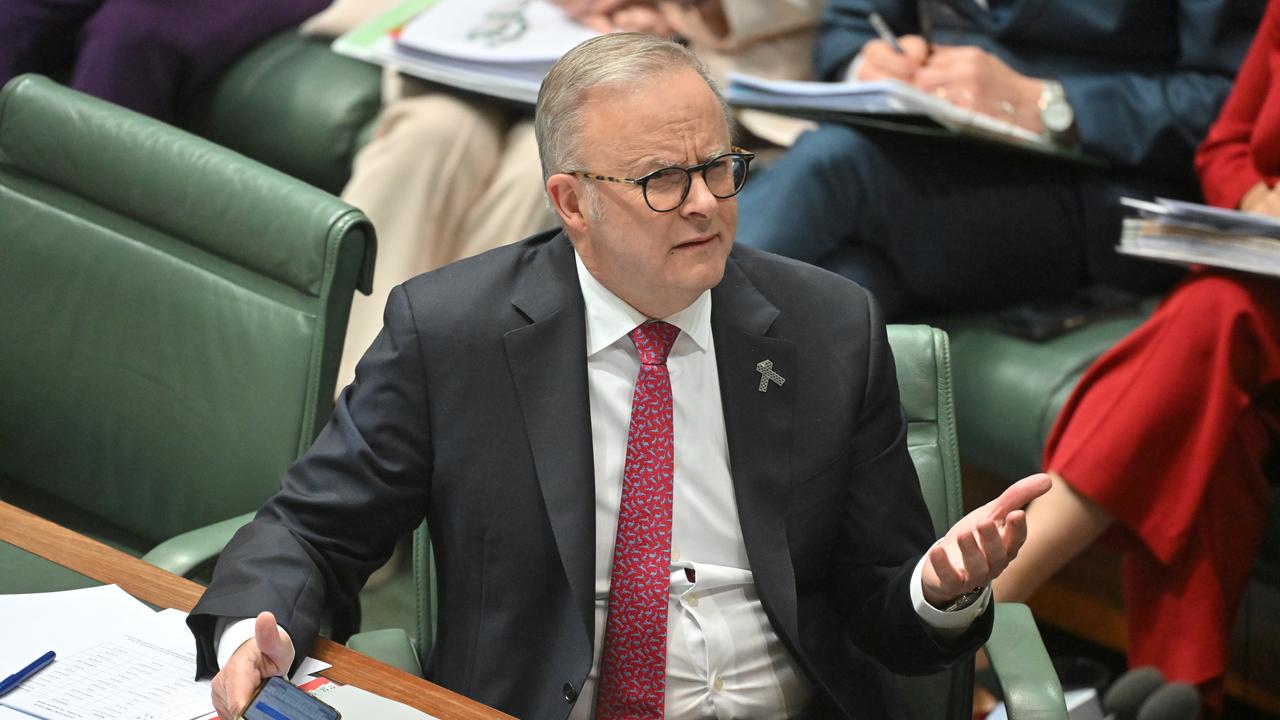
But Mr Albanese came under fire from the opposition in parliament for not listing the organisation as a terror group two years ago after advice from the Department of Home Affairs.
“There were calls to list the IRGC back when I was the chair of the intelligence Committee (while in opposition), which was from 2017 through to late 2020,” he told parliament.
“The government makes the decision to amend the criminal code and then list a terrorist organisation.
“For whatever reason, the coalition government did not want to (list the IRGC as a terrorist organisation). In fact, we had briefs as to the reason why, which I can’t discuss here.”
Following the expulsion of the ambassador, community leaders have said Australians of Iranian heritage face verbal abuse and intimidation.
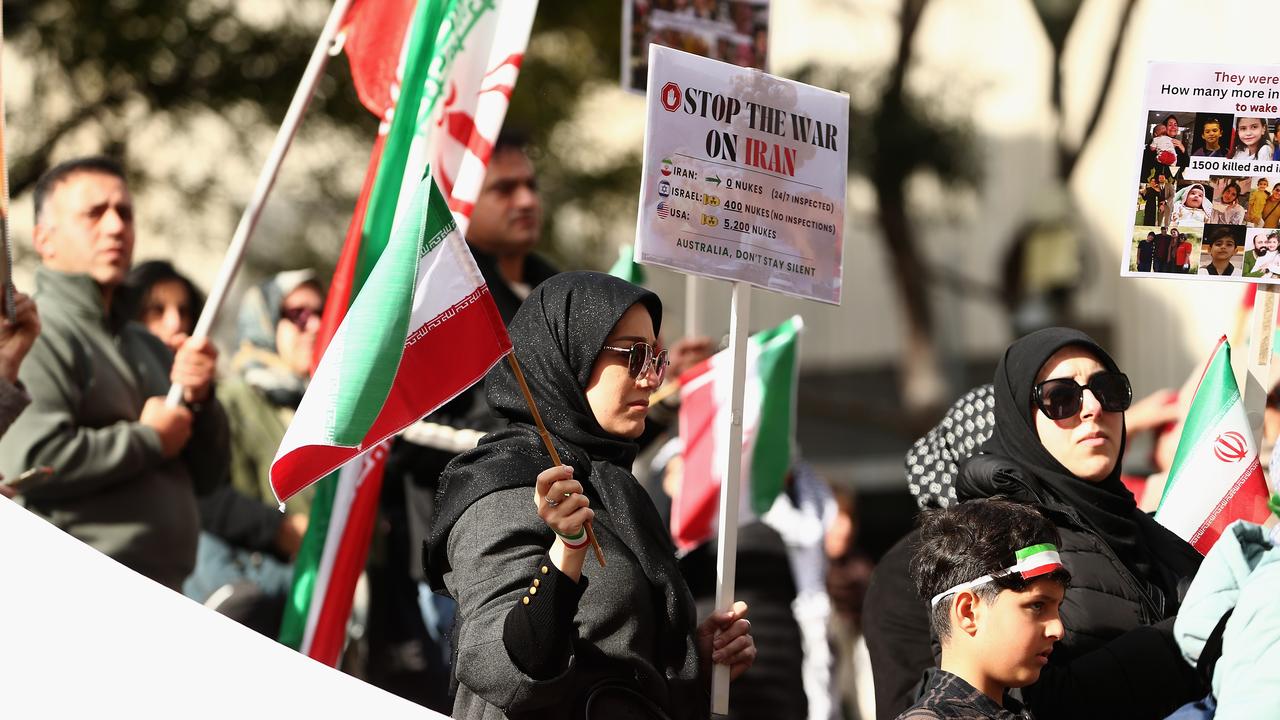
The local diaspora had been asking for the ambassador’s expulsion since 2022, following the regime’s crackdown on the women’s rights movement, Australian Iranian Society of Victoria vice president Kambiz Razmara said.
He said there had been reports Australia’s Iranian community was being conflated with the actions of Iranian authorities.
“It is important for people to recognise that we, the Iranian diaspora, are opposed to what happens in Iran,” Mr Razmara said.
“The Iranian diaspora, by and large, are here because they’re seeking freedom and social cohesion and freedom of expression and democracy, so anything that tarnishes that we are resolutely against.”
The government had taken the right step after Iran’s “insidious, underhanded” work in destabilising Australian society, said David Andrews from the National Security College at the Australian National University.
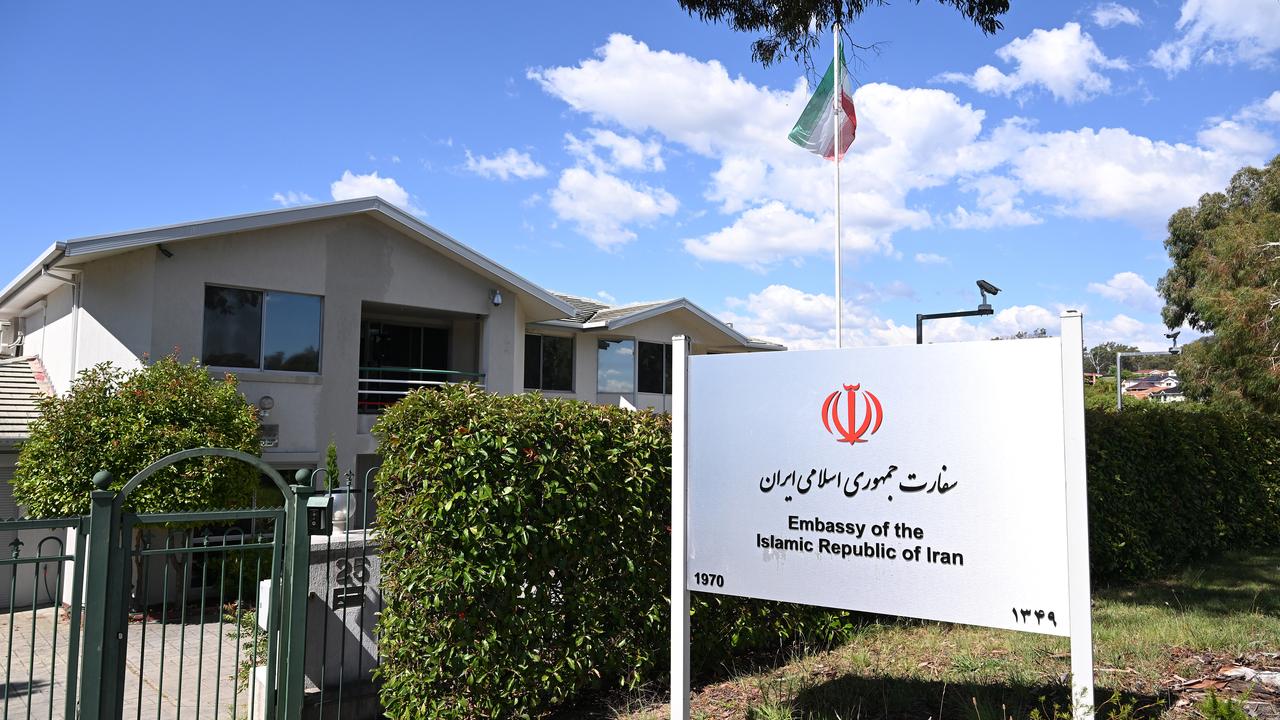
On Australia’s relationship with Iran, Mr Andrews said Canberra had in the past been able to conduct diplomacy on behalf of its friends and allies who did not have a mission in Tehran.
“(The expulsion) potentially puts that role at some risk,” he said.
Australia should expect some retaliation.
“The risk of people being used as political pawns, or people who have either dual citizenship or Australians passing through Iran, could be used as a point of leverage or sort of in response to this action,” Mr Andrews said.
“There’s no one who will be rushing to try and repair those ties too actively.”
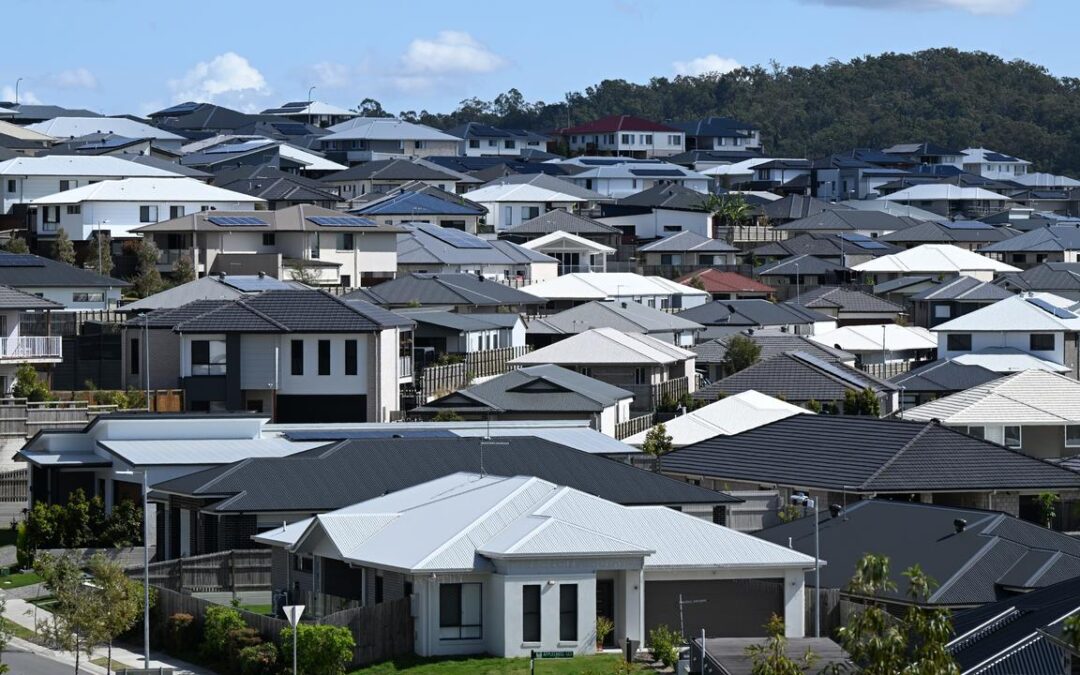
Social housing not just a ‘nice thing to do’
The woman tasked with fixing Australia’s most expensive housing market admits her government failed in its handling of a record-breaking investment in social homes.
More than $6.6 billion for social housing and homelessness services headlined the NSW budget in 2024, the state’s largest post-war investment in the sector.
But Housing Minister Rose Jackson told industry players on Thursday she failed by selling the investment as a “nice thing to do”, rather than “profoundly necessary” for the state’s economy.
“My failure was to frame this policy in the public narrative as a do-gooder, a helping-hand for people struggling with homelessness or housing stress, a nice thing nice governments do to help those who are less fortunate,” she told the Committee for the Economic Development of Australia.
“It was a failure I made not talking about how ensuring people in this state have access to safe and affordable housing is the greatest economic stimulus package that we could possibly design for NSW.”
Homes NSW is tasked with building 8400 new public houses as part of the $6.6 billion investment.
CEO Rebecca Pinkstone said it might not sound like many, but its flow-on effect could be big.
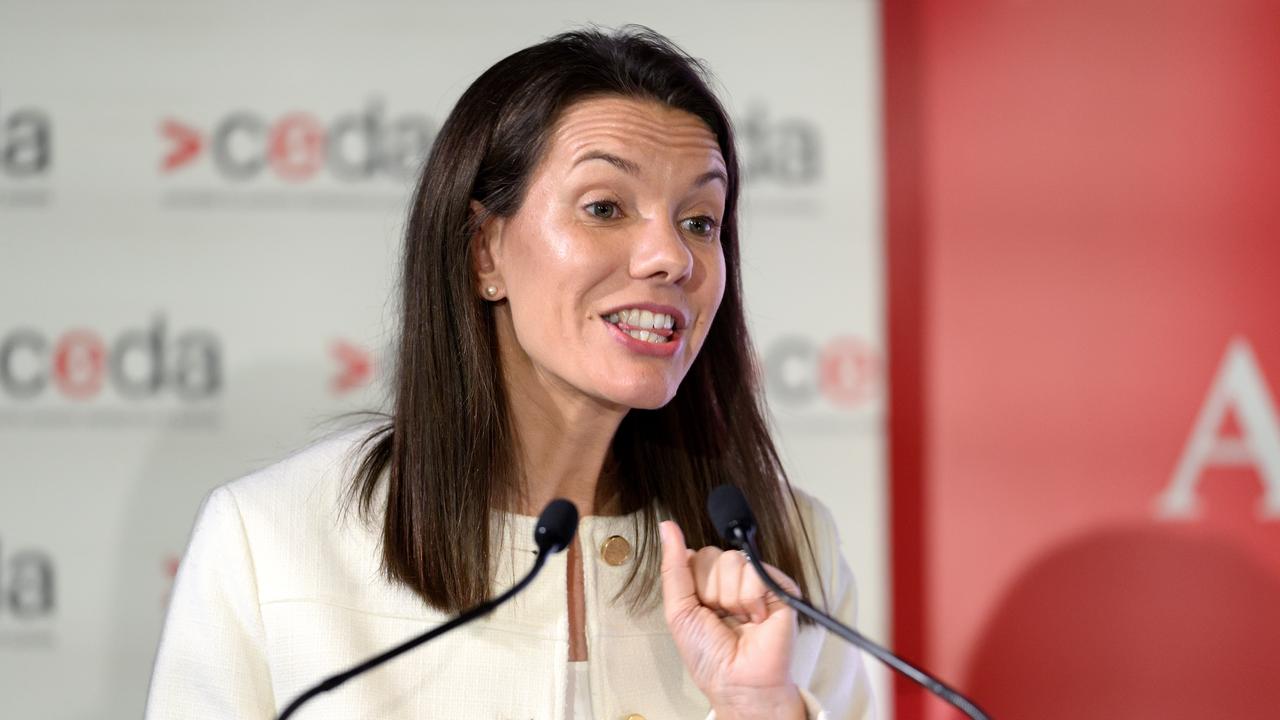
“While it might be 8400 social homes, that’s unlocking actually 30,000 private market and affordable homes in NSW,” she said.
“The multiplier effect of the state stepping in to say ‘there’s a role for us to play in public housing’ actually has broader impact on the housing market and the delivery of housing.”
Cities able to balance growth and livability can bring massive advantages, including saving $5.3 billion on rent annually, Monash University researchers said on Thursday.
Their study of 655 Australian cities found sustainability peaks when population figures are within four per cent of ‘ideal capacity’, which is when housing, jobs, transport and services operate in balance.
Living in the “Goldilocks zone” saved tenants an average of $1560 in rent every year, cut car usage in 275,000 households and allowed more walking to work.
Canberra, Adelaide and Perth were considered in the zone while Gold Coast, Newcastle, Melbourne and Sydney were all above the four per cent threshold.
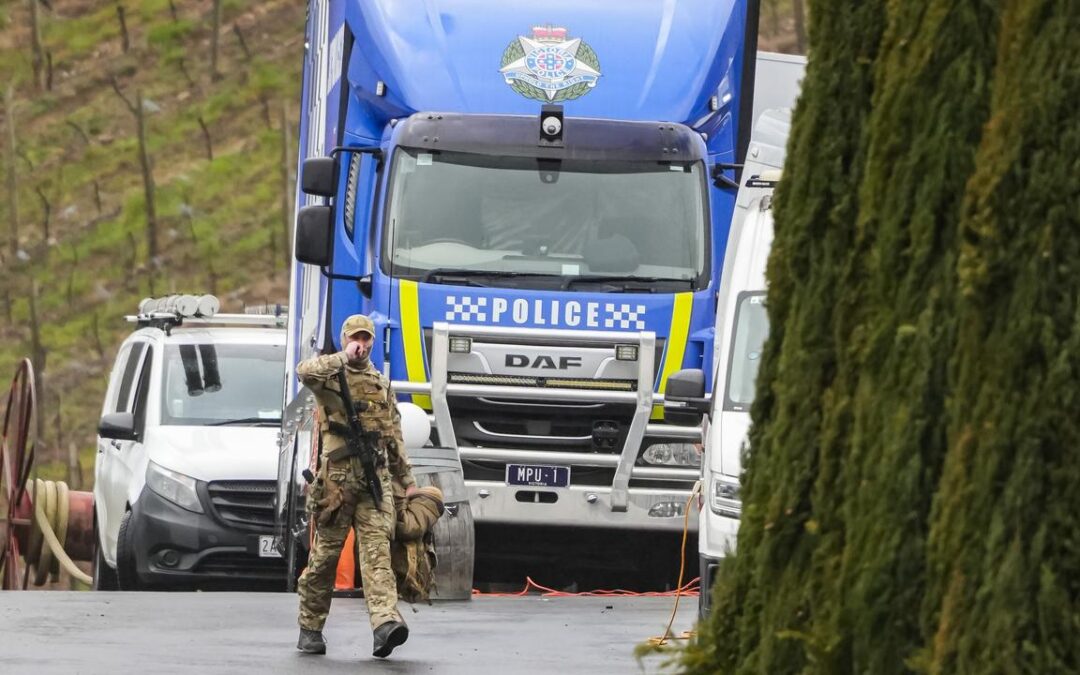
Public warned over fugitive as police search properties
Police have warned anyone caught harbouring a fugitive accused of shooting dead two officers will face serious consequences as the “protracted search” continues.
Detective Leading Senior Constable Neal Thompson, 59, and Senior Constable Vadim De Waart, 35, were shot dead while attempting to serve a search warrant at a Porepunkah property on Tuesday.
Another wounded officer is expected to recover after undergoing surgery.

The accused gunman Dezi Freeman – also known as Desmond Filby – fled into bushland, plunging the town of about 1000 residents in Victoria’s high country into lockdown.
The search for the 56-year-old suspect has entered its third day.
Deputy Commissioner Regional Operations Russell Barrett described it as protracted and revealed police were searching “a number of properties” as part of their inquiries.
“What I would say to the community and say to anyone who may be considering harbouring or supporting him, they need to reconsider,” he told reporters in Wangaratta on Thursday afternoon.
“They’re committing a criminal offence, and we will prosecute them.”
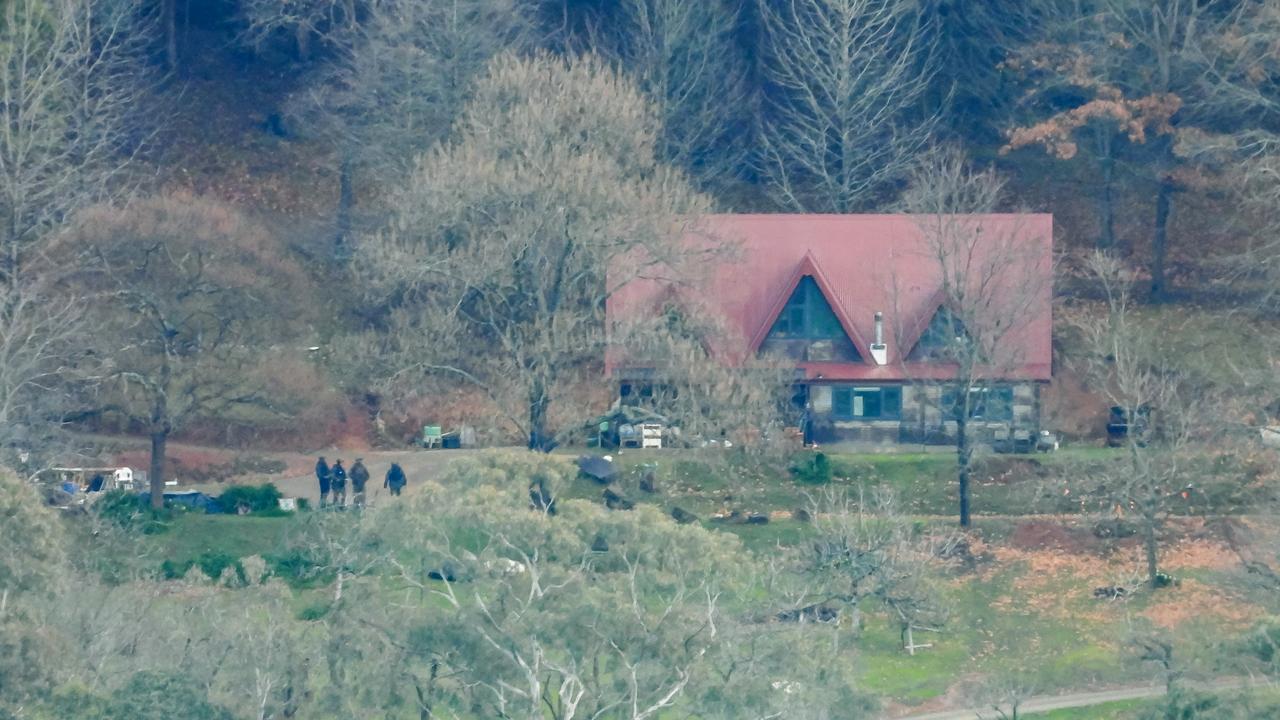
The property he was living on is now vacant.
There have been no confirmed sightings of Freeman since he fled into bushland, Mr Barrett said.
Superintendent Brett Kahan said police had no evidence Freeman had access to communications but had a message if he was watching.
“Ring triple zero, and we will support a surrender plan, that option is absolutely open to him,” he said.

Freeman, who has bush survival experience, was last seen wearing dark green tracksuit pants, a dark green rain jacket, brown Blundstone boots and reading glasses, police said.
He is believed to be a sovereign citizen, an ideology that questions government authority and whose followers believe the rule of law doesn’t apply to them, and who disassociate from society.
Feathertop Winery continues to be the staging area for police, with nearly a dozen police cars gathering along the road outside the property on Thursday afternoon.
Overhead, a police helicopter has returned, circling the area.
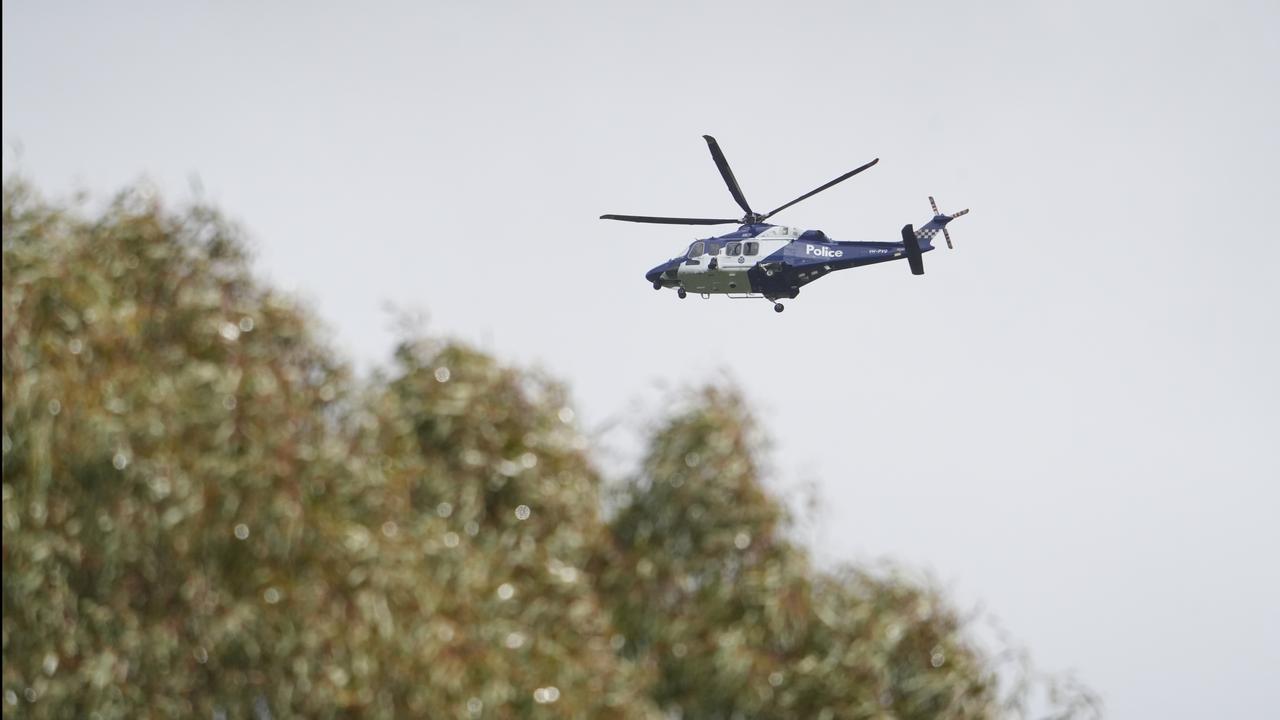
A roadblock has been set up and has since been pushed back by one kilometre.
Low-lying fog had lifted in the area by the early afternoon before the inclement weather returned.
Supt Kahan said the terrain was dangerous, with police treading carefully.
“It’s not something that we, even with our specialist resources, can move through quickly,” he said.
Porepunkah Primary School reopened to students on Thursday after it went into lockdown following the shooting.
The decision was made on the advice of Victoria Police, the education department said.
The school’s principal Jill Gillies said attendance on Thursday was voluntary.
“It’s a parent choice,” she said.
Some students were kept home, with their classmates expected to be kept inside for recess and lunch due to the bad weather.
Police and support staff were present on site throughout the day.
Jean-Francois Rupp expressed mixed emotions when dropped his six-year-old child at school.
“It’s all a bit weird and up in the air, but I suppose life’s got to continue,” he said.
“He just knows there’s a bad man out in the woods, so we’re going to keep the story to that for now.”
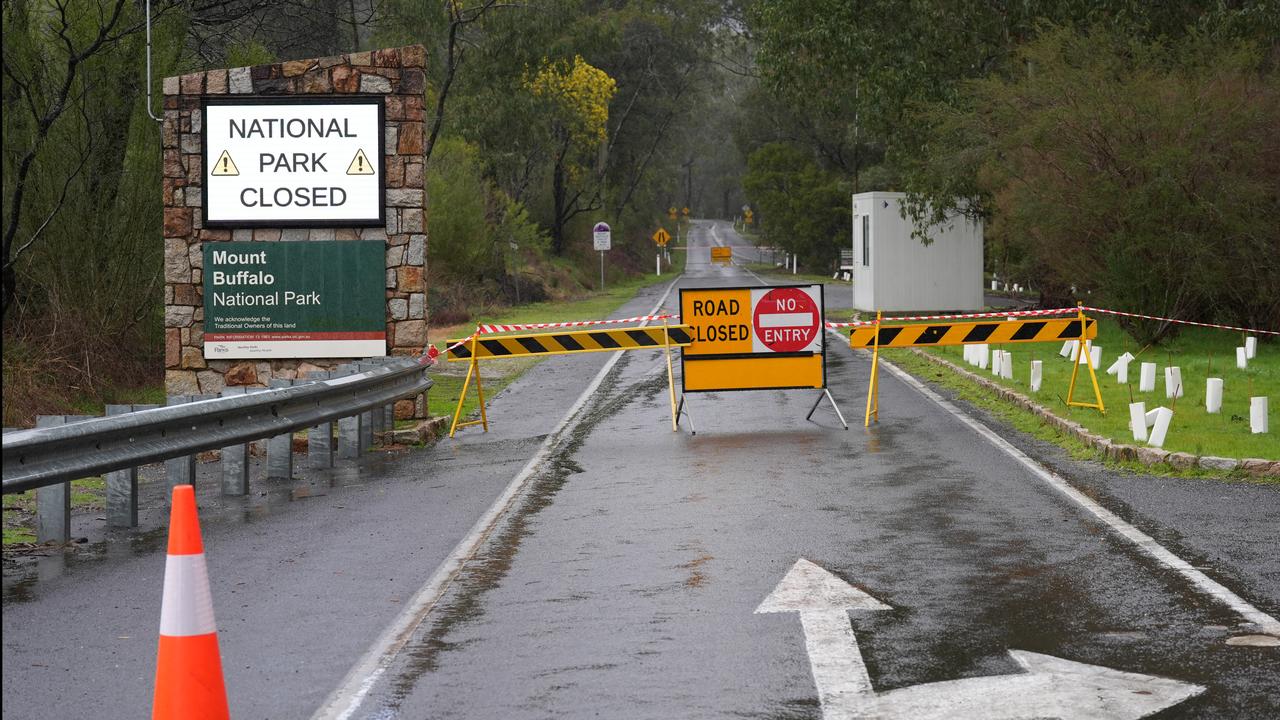
Police have issued advice recommending motorists heading for Bright, Falls Creek and Mount Hotham avoid travelling through Porepunkah.
They should instead travel through Running Creek and Mount Beauty, police advised.
“If you have an option not to go to the snow this weekend, take that option,” Supt Kahan said.
The bodies of the fallen officers were given a guard of honour by flashing-light police cars as they were taken to Melbourne’s Coroners Court on Wednesday night.
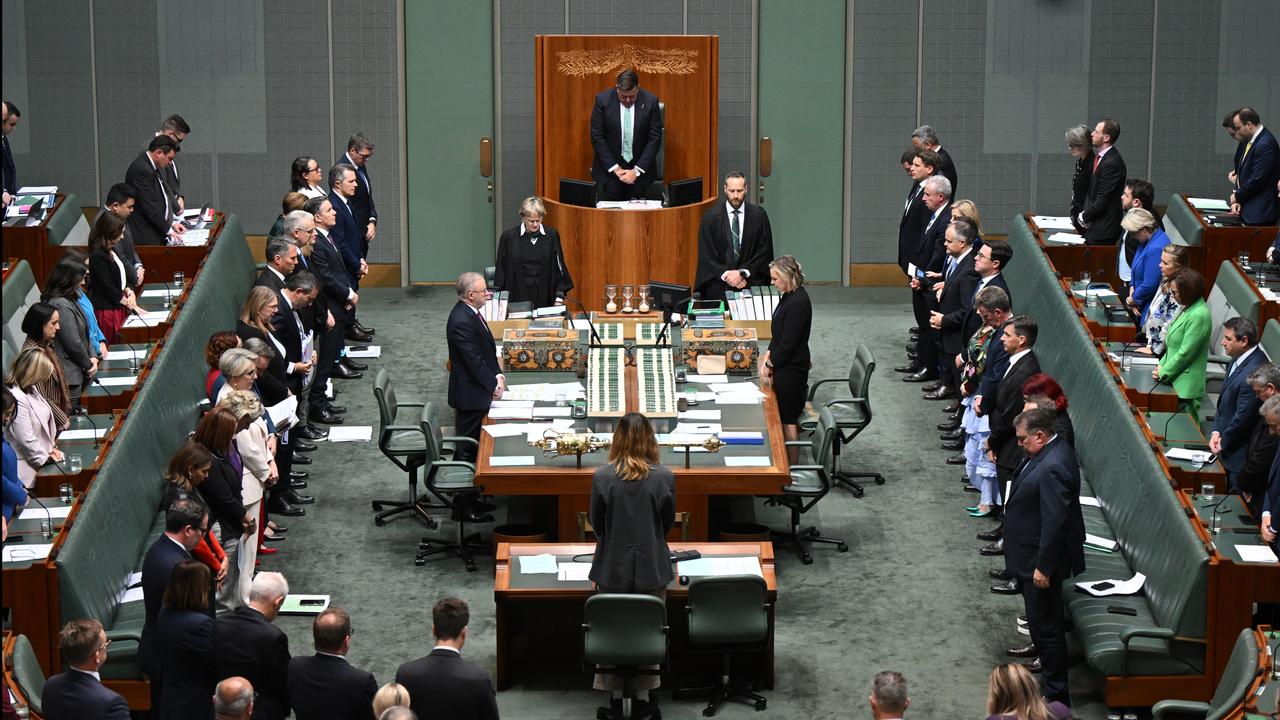
Prime Minister Anthony Albanese led a moment of silence for the pair in federal parliament on Thursday.
“Every time they put on their uniform, police officers put themselves on the line,” he said.
“And they do it for us.”
The officers were heroes and their deaths were heartbreaking for all Australians, Opposition Leader Sussan Ley said.
Melbourne’s iconic landmarks were lit up in blue overnight to honour the dead officers.
Flags remained at half-mast at Victorian government buildings on Thursday.
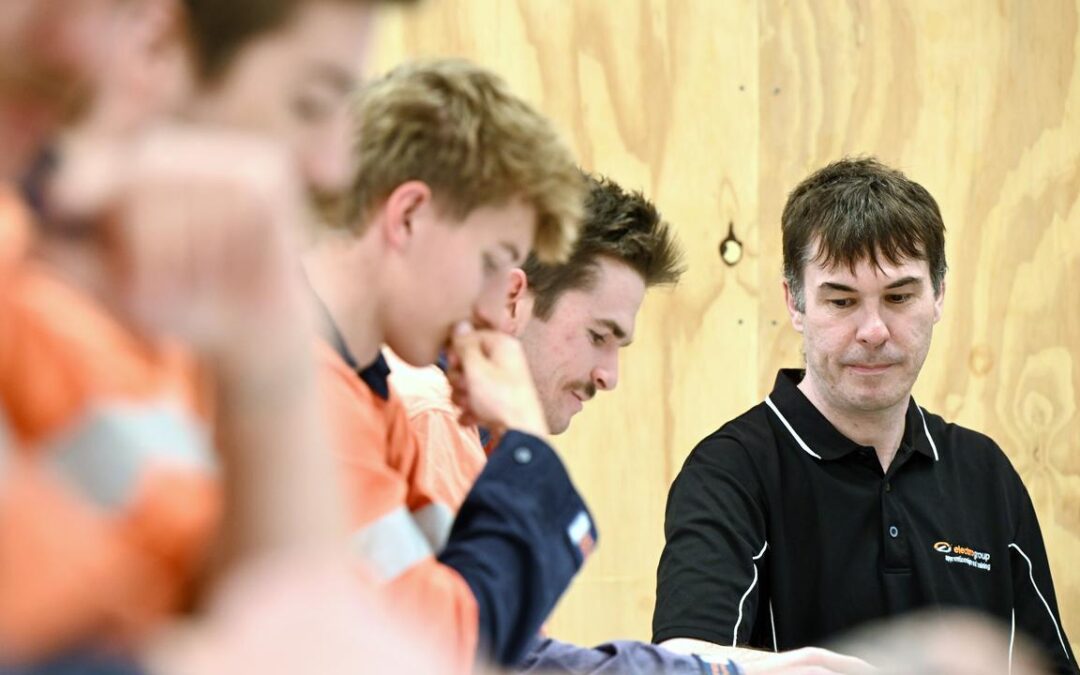
Calls to power up energy workforce as shortfall looms
As the sun sets on the Eraring Power Station’s operating life, Brett Harvey is one of several employees keen on staying in the energy industry.
Nearly all workers at Origin’s power station in NSW, due to shutter in two years as the nation weens itself off fossil fuels, have been eligible for retraining in whatever they choose.
Some have pursued careers outside the energy industry but more than 80 per cent have decided to stay, taking up the opportunity to train up as electricians or other occupations better suited to a low emissions economy.
It’s a welcome trend at a time when Australia faces a 42,000 shortfall of energy, gas and renewables workers by 2030 that the Powering Skills Organisation warns could blow out further without concerted effort to keep people moving through the training system.
An extra 22,000 apprentices should have been on the tools last year to meet the workforce needs of the transition, according to the government-backed independent jobs and skills council.
A failure to keep a healthy pipeline of electricians and other essential occupations progressing through training risks further slowing a clean energy transition already feeling the weight of cumbersome planning processes, community opposition and other roadblocks.
Mr Harvey, currently an instrumentation technician, is looking at a number of upskilling opportunities in the energy space, including a training and assessing certification.
A shortage of educators and training infrastructure has proven a stubborn problem and a top priority for Powering Skills Organisation chief executive officer Anthea Middleton.

Getting employers to take on apprentices was a perennial issue, she explained, exacerbated by an eight-fold increase in the value of major energy projects over the past 10 years.
“What is often misunderstood in the system is that everyone wants to hire a trained electrician, but no one wants to train the electrician,” she told AAP.
Training is a costly exercise dominated by small businesses that often do not reap the rewards of an extra pair of hands because their apprentices are snapped up by bigger outfits in their third or fourth years.
Enforcing early-stage apprentice quotas on major projects, namely large businesses, was flagged by the organisation as a way to incentivise the big end of town to bring on fresh trainees.
Ms Middleton was “urgently optimistic” Australia’s workforce hurdles could be overcome to clear the way for a fast, efficient energy transition but it was important to be ambitious.
“We really do need a collective view from the states and territories and the federal government on things like energy policy, on things like system reform,” she said.
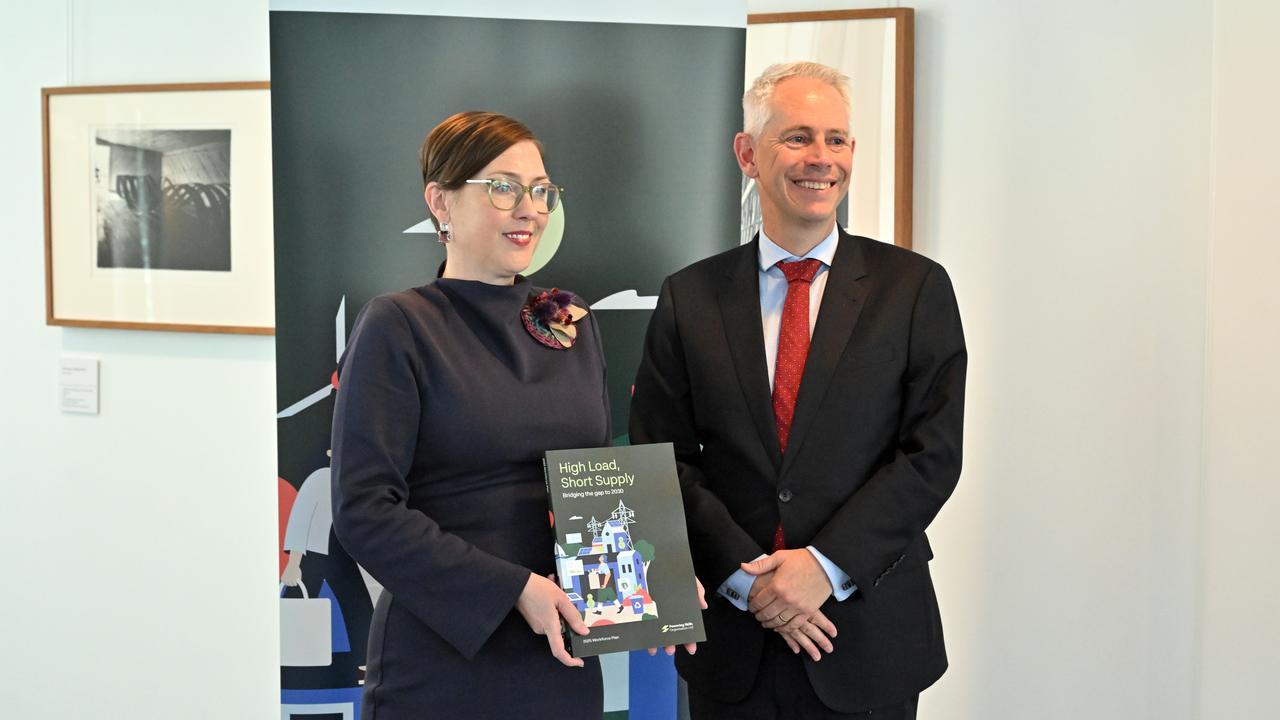
Federal Skills and Training Minister Andrew Giles said meeting the energy workforce needs of the nation represented both a “huge challenge” and “equally huge opportunity”.
“Achieving our net zero targets, powering Australia with cheaper, cleaner, more reliable energy will, of course, require a large, indeed, a larger and a highly skilled workforce.”
Mr Giles outlined a number of existing federally-funded programs aimed at solving problems in the trainee pipeline, including a $30 million commitment towards turbo-charging the teacher, trainer and assessor workforce.
“We need to continue to work together – governments, industry, unions and other stakeholders – to get more apprentices into Australia’s energy sector.”